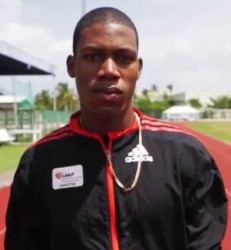LONDON, (Reuters) – Whether he is a “plastic Brit” or a legitimate new member of “Team GB”, teenage sprinter Zharnel Hughes is the latest face of one of the most contentious issues in world sport — nationality switches.

Hughes, 19, has held a British passport since his birth on the Caribbean island of Anguilla, a British overseas territory not recognised by the International Olympic Committee.
So on Tuesday, he became one of five athletes to switch allegiance to Britain proper.
The move might have gone generally unnoticed but for the fact that Hughes is very, very fast, the latest in an admittedly long line of sprinters to carry the burden of being described as the “next Usain Bolt”.
Earlier this month he was, in fact, the next after Jamaican Bolt as he pushed the world record holder all the way to finish second over 200 metres in New York. His best time over the distance of 20.15 seconds has immediately put him top of the British rankings this year.
His target is to run for his new country in the 2016 Olympics.
But Hughes’ arrival, while seemingly boosting Britain’s medal chances, has not been universally welcomed. World indoor champion Richard Kilty tweeted “Good for fans to see home-grown talent representing GB…oh wait” – becoming embroiled in a Twitter row on the issue.
Also “becoming British” on Tuesday was American sprint hurdler Cindy Ofili, who follows in the footsteps of older sister Tiffany Porter, whose switch in 2010 brought the term “plastic Brit” to the fore. They have a British parent.
Two more Americans and a Swede completed Tuesday’s switch.
Athletics of course, is far from alone when it comes to flying the Union Jack flag of convenience as the dressing rooms of England’s national cricket and rugby union teams can seem more southern hemisphere than southern counties.
However, anyone thinking this is a British issue is sorely misguided. Nations the world over are plundering whatever feeder source they can to further their own ends.
New Zealand’s rugby relationship with the Pacific Islands is a complicated one but the bottom line is that the All Blacks are routinely strengthened by a conveyor belt of talent from the likes of Fiji, Tonga and Samoa, whose proud sons will appear in the colours of around half the 20 teams in this year’s Rugby World Cup.
